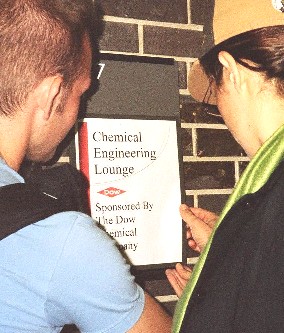Is Dow at YOUR school? If so, perhaps it’s time they were expelled! Dow has donated more than $60 million to schools across the country, and colleges and universities, in turn, have invested nearly $120 million in Dow. Dow also spends tens of millions of dollars on research every year at schools across the country (such as this Nebraska study, which actually involved students) and heavily recruits the brightest minds that schools and students have to offer. Frankly, our institutions of learning are a central strategic, reputational, and financial interest to Dow. This raises two interesting points:
Find out if Dow is at your school by browsing the information below. If they are, spread the word – and then do something about it.
Open Records Requests A sample Bhopal request is available here. Since Open Records laws vary from state to state, use this letter generator to draft your own request. Find out where to send an Open Records Request by going to your university’s website or calling the office of financial affairs/business administration or a similar office. It shouldn’t be too difficult. Be Nice to Secretaries and Other Staff Be Prepared to be Interrogated It's best not to outright lie in response to these questions. If you lie and say it's for a class, you'll have to be ready to say which class and who the teacher is in case they ask. It's okay to be vague or exaggerate a bit, but outright lying may catch you really unprepared and can hurt you if you can't follow it up or if you get caught. Administrators are generally savvy enough to know that you're not just doing this for no reason or out of simple academic curiosity. You can try to say that you’re not sure what you'll do with the information at this point or you can give some soft answers which only hint at the full range of what you might do with the info. Definitely don't be blunt and say that you're looking for any information you can use to attack the university with. It won't help! Don't let the interrogation go deeper than you want it to go. Take advantage of pauses in the conversation to change the topic and ask questions of your own. Put Requests in Writing Format Interviews Prepare for your interviews: brush up on your jargon and background knowledge; work out three or four different ways in which you can squeeze out the information you require, and anticipate possible responses. Decide beforehand whether you're going to leave your source friendly or hostile to you after the interview. Bear in mind that schools contain many people. If one is unhelpful, you can always try someone else, possibly with a different alias. Looking at the university’s website beforehand, or even talking to a receptionist, may give you an idea of how the university’s structured and with whom you’ll want to speak. Getting direct line numbers is always useful. On the other hand, if you ask two different people for the same information, they might both go to the same colleague for it. So be careful there. Always document your interviews, including time, place, who you spoke to and their position, any alias you used, major points, important quotes. In interviews, open-ended questions allow the subject to tell you more - you may get something unexpected. Throw in a few dummy questions to put your subject at ease and if necessary cover your real interests. Look for leads (eg other people) as well as answers. What the subject doesn't want to talk about may provide interesting leads.
It’s up to you whether you tell your source who you really are. That may lead to them seeing you as an enemy and not helping. If you tell them you’re someone else, adopt an identity of someone they actively want to talk to (i.e. it’s in their interests) – a potential customer, client, supplier, employee, journalist, local historian etc. It often helps to flatter the school or the person you’re talking to, to make them feel at ease and relaxed. And give them an opportunity to boast (e.g "I know that the University of the Tasty Rutabaga receives lots of money from leading corporations…” “Yes we do! Why, we just received a check for $50,000 from Dow last week!” Generally it’s easier to be someone of low rank – this is less threatening, and gives you an excuse for not knowing the answer to all their questions ("I’ll have to ask my boss / client"). If you can throw in chatty comments, that helps too ("sorry about my voice, I’ve got this throat bug", "I can’t find my notes, our office is just being re-decorated", "when I took my daughter to school this morning…", etc). Occasionally you might find it useful to be more authoritative and confident, and semi-intimidate your interviewee into helping you. When using an alias, try to keep a grain of truth in it, so that you can talk about yourself if pushed. It's probably worth keeping a note of who you are somewhere - forgetting your own name, for instance, can be highly embarrassing! If you're meeting subjects in person, remember that people tend to be remembered by their most prominent features (e.g. "oh yeah - the guy with the red hair / round glasses / lapel badge / stammer"). You should therefore cover any memorable features of yourself, and create some that you don't usually have. If you normally smoke, don't. If you don't wear glasses, do, etc.
If you’re at a college or university, your school most likely has a heap of money (called an endowment) that it invests in the stock market to make extra money for the school (it may also invest a substantial amount through its pension fund). Your school probably invests in hundreds or thousands of corporations, one of which may be Dow. What to find out How to find out? If your school is private, you may have to be a little more creative. A good place to start is in your school's administration building. Once you're there, look to see if there’s a financial office other than the type of office that would deal with student stuff (i.e. not your student loan office and not where you pay tuition). If you can't figure it out easily, stop in any office and do this:
You'll probably need to ask a secretary your question first. Ask if this is the office that has a list of university investments, and who is the right person to ask for a copy of it. Generally, someone will appear from an office tucked away behind the secretary and will grant you a few minutes of their time. Sometimes, you'll be told that the person you need to speak to is out of town, in a meeting or otherwise unavailable. If so, find out exactly when would be a good time for you to come back and find this person. You may be given a chance to set up a meeting with this person; if so, take it. If you get to speak to someone who knows about investments, you'll
have to explain what you're looking for. Here's what you can say:
What NOT to do: Don't confuse the school investing in corporations with "investing in the school." Nearly all schools are non-profit and it's not possible to "invest in the school." If you act as though you're asking how to invest in the school, they'll think you're bat crazy. Expect to be interrogated a bit and handle this as best you can. If your school has a money manager like a bank investing on their behalf, or if they’re invested through a mutual fund, they may claim that they don't know what they're invested in. Although it’s true that their investments are always changing, they can find out what they are if they want to and they can provide a "snapshot." Penn State University, after pressure from students, agreed this past year to start releasing a "snapshot" of their investments each summer. You can ask for something similar. If that doesn’t work, there are other avenues that you should look into. Most investments are overseen by of the President’s office and the Board of Trustees. Going into their section of your school’s website will probably shed some light on how the investments are handled. It will be relatively easy to get information that has already been processed for distribution to alumni, current and prospective students, parents, local governments and others. However it may be challenging to obtain fully sufficient answers to the range of questions you are asking. It will require an investigative spirit, along with much time and patience! You or other members of your group or coalition may need to seek out and talk with a range of college officials. You may also find that your university library is a valuable source of information. Explain to your reference librarian the sort of information that you’re looking for and ask for their suggestions and advice. If You Get the Information If You Don’t Get the Information
Dow buys influence at schools across the country by funding buildings, renovations, endowed professorships, programs, science centers, scholarships, research, lecture series, conferences, and by making at-large grants to schools and individual departments. Sometimes Dow participates in advisory boards that may help oversee such things as faculty hiring, student recruitment, curriculum content, and graduate research programs. Funding may come directly from the Dow Corporation, or may be channeled through the Dow Foundation or one of its subsidiaries. Dow typically funds engineering departments, business schools, and public health departments, but it may also fund environmental departments, risk assessment research, or technical training programs.
Has Dow bought influence at your school? If your school is public, you should be able to find out by filing an Open Records Request. One catch: some public universities have private non-profit foundations, like "Foundation for Blah University" or "Blah University Foundation," which are separate entities from the school itself and handle some or all of the contributions made to the school. This means that, even though you may attend a public institution, you may have to be a little more creative in your research. One great source of information may be your own school’s website. It’s likely that you will find dozens, if not hundreds of pages that catalogue Dow’s associations with your college or university in detail. If Dow sponsors an event, they’ll often be thanked on the event’s webpage. Your university or a college department will probably also thank Dow for its at-large contributions in either a presidential report or a fiscal review. If Dow made a special donation to fund a building project or an endowed professorship, there may be a university press release available on the web that highlights the contribution. Although it may seem like dreary work, it’s often very effective to scroll through university websites looking for connections. Most colleges and universities have a ‘search’ option that allows you to find matching pages on the university web. Sometimes the search box is even on the university homepage; if not, a link should appear. Try typing in “Dow Chemical”; ‘“Dow Chemical” AND contribution’ (or donation or grant); and ‘“Dow Chemical” AND Foundation.’ See what comes up and scroll through the pages! One variant: your college or university most likely offers free access to Lexis Nexis for students. You may have to go through a library computer or enter a school ID. Lexis Nexis allows you to search years of media documentation - newspapers, news wires, etc. The Guided News Search provides options for selecting a preferred media type as well as searching for various terms throughout the articles. Students will usually want to select General, Business and University news. When accepting Dow’s funding or announcing the establishment of a Dow chair, prominent college administrators will often announce that the contribution only furthers the intimate relationship that the college and the company already share. Such quotes are worth their weight in gold if you can find them, as they can demonstrate how closely related your college and Dow really are. You’ll most often find them featured in university press releases, which may be available on the web. If not, check your university’s News and Information Bureau. You may also find that your university library is a valuable source of information. Explain to your reference librarian the sort of information that you’re looking for and ask for their suggestions and advice. If you’re at a medium- to large-sized university, chances are your school gets a good deal of money from research grants. Depending on what your school specializes in, these may include substantial research projects funded by Dow. The research itself may be for something good – though, knowing Dow, it’s more likely for something bad (students: here’s one example). In any case, your mission, should you choose to accept it, is to find out what research Dow’s funding at your school – once you know, you can make life difficult for Dow, and build on the pressure for them to accept responsibility for Bhopal. So how do you find out? If your school is public, you should be able to get the information by filing an Open Records Request. If your school is private, as in so many things, you may have to be a little more creative. Your Office of Sponsored Projects (or Grants and Contracts Office? So many names…) should maintain a yearly catalog of grants that lists the amount, principal investigator (the professor doing the research), title and sponsor of the project. This list should give you a general picture of corporate sponsored research at your university. Track down your school's office and ask for it. Caution: research contracts themselves often include 100 pages of irrelevant information, so it’s best to choose what you want carefully before becoming inundated with paper. Another source of information is your school’s webpage. Search the site, be creative and follow the links. Also, surf the web pages of researchers, professors, and labs at your university. Most often the funding agency will be listed somewhere on the page. For quick searches use the "find" option on your browser by holding the “Control” and “F” keys at the same time. If you’re lucky, your school may have a University/Industry Relations Office: a university office dedicated to linking researchers with industry! Check out their information and ask them for help. Does Dow recruit on your campus? If you’re at a medium- to large-sized university, or if you’re known for your excellent programs in chemistry, engineering, business, or bullshit, it probably does. The question is: should it? At the very least you can make their life difficult by giving their potential employees the other side of the story – the story that they won’t be getting in the interview room. The first place to look is your school’s Career Development Office (or something similar) which usually keeps track of all the recruitment interviews and events that take place on campus. Try asking – but if you want to find out, it’s best not to introduce yourself as a troublemaker. Instead, try posing as a chemist, an engineer, or someone else with a legitimate interest in working for Dow, and request a calendar of upcoming recruitment events. Later on, it might be interesting to know whether your school has any standards for admitting employers on campus (if it admits Dow, it probably doesn’t). Larger colleges and universities often arrange several on-campus career fairs per semester, inviting students to mingle with prospective employers. Sometimes a special "corporate week" is reserved for large firms. These events include slideshows and question-and-answer sessions designed to persuade students to work for the company. These would be a good place to look for Dow, and possibly rain on their parade. Depending on your school, Dow may also arrange interviews through university departments, and it may be difficult to find out about these from a central source. Try asking around – but try not to arouse too much suspicion. - top - Now that you know whether Dow is associated with your university, you can decide what to do about it. Read through the Students for Bhopal campaigns and develop a plan for the coming year. One of the first steps in any plan will probably involve bringing your research to light, so prepare to go public by using your campus or local media. You may also find it useful to compile everything into a one- or two-page factsheet. Be sure to cite your sources and organize associations into categories (here's an example). This factsheet can then be passed out at your events, publicized with your college newspaper, or presented to your university with petition signatures calling on the university to take action. Whatever it is that you decide to do, the information that you gather may prove to be a valuable justification and useful tool for the Bhopal organizing that you do on your campus. Don't forget to share what you learn with Students for Bhopal! - top - The following information has been collected over the past two years by Students for Bhopal. In most cases, this information was obtained through the use of Open Records Requests (documentation available on request). It reveals that Dow has donated more than $60 million to schools across the country, and that colleges and universities, in turn, have invested nearly $120 million in Dow. Schools are listed alphabetically below. If you have additional information that should be added to this page, please contact Ryan. University of Arizona Given to School: $145,500 Arizona State University Given to School: $105,500
Barnard College Given to School: ??? University of California, Berkeley Given to School: $4,335,811 University of California, Davis Given to School: $3,266,416.10 University of California, San Diego Given to School: $95,932.00 University of California, Santa Cruz Given to School: $178,205.00
California Institute of Technology Given to School: ??? Central Michigan University Given to School: At least $7,570,000 University of Charleston Given to School: ??? University of Cincinnati Given to School: $575,176.21 Columbia University Given to School: ??? Delta College Given to School: $375,885 Grand Valley State University Given to School: $7368.34 Harvard University Given to School: ??? Hillsdale College Given to School: ??? University of Houston Given to School: $1,832,953.91. University of Illinois, Chicago Given to School: $357,916.04 University of Illinois, Urbana-Champaign Given to School: $6,599,154.91 Indiana University Given to School: $120,475
Kansas State University Given to School: ??? University of Maryland, College Park Given to School: $384,625 Massachusetts Institute of Technology Given to School: At least $1,000,000 University of Michigan Given to School: $12,853,419.58 Financial Ties Alumni Ties Administrative Ties Sponsorship Ties Research and Advisory Ties Michigan State University Given to School: $10,724,439.62 University of Minnesota Given to School: At least $300,000 University of North Carolina at Chapel Hill Given to School: $252,661.50 University of North Texas Given to School: $66,097.50 Northwestern University Given to School: $66,097.50 Ohio State University Given to School: $2,164,112.07
University of Pennsylvania Given to School: ??? Penn State University Given to School: At least $5.5 million "The relationship between Penn State and Dow spans more than four decades, and we are deeply grateful for Dow's generosity," said Penn State President Graham B. Spanier. "It is a testament to the high quality of our programs when major companies like Dow include Penn State in the limited pool from which they recruit." Penn State receives annual grants from Dow in support of engineering student groups and the Department of Chemical Engineering. Previous philanthropy to Penn State also includes a faculty chair in chemical engineering, support for an interview room in the MBNA Career Services Center, and research projects in agricultural sciences, chemistry, chemical engineering, earth and mineral sciences, and materials research. Dow also is a member of the Institute for the Study of Business Markets in the Smeal College of Business. Dow sponsored a tailgate party; helped fund the $9.5 million MBNA Career Services Center; corporate donor to the Chemistry Department 2001-2002; sponsor of Women in Engineering Program's (WEP) Girl Scout Saturdays; $6000 renewal grant to support WEP's retention/career development activities; 2000-2001 "Gold" Corporate Partner of WEP - $5000 contribution or above; 2003-2004 "Gold" Corporate Partner of WEP - $5000 contribution or above; 1997 sponsor of Penn State's Visit in Engineering Week (VIEW) Program for high school students of color; 2000 member of the Pennsylvania Housing Research/Resource Center; the College of Health and Human Development is partly funded by the Dow Foundation ; 2002-2005 contributor to the Society of Hispanic Professional Engineers at Penn State.
Sam Houston State University Given to School: ??? University of Texas, Austin Given to School: $4,429,113 Tufts University Given to School: ??? University of Washington Given to School: $3,058,535 West Virginia University Given to School: At least $500,000 University of Wisconsin, Madison Given to School: ??? University of Wisconsin, Milwaukee Given to School: $77,881.88
|
The international student campaign to hold Dow
accountable for Bhopal, and its other toxic legacies around the world.
For more information about the campaign, or for problems regarding this
website, contact Ryan
Bodanyi, the Coordinator of Students for Bhopal.
WE
ALL LIVE  IN
BHOPAL
IN
BHOPAL
"The year 2003 was a special year in the history of the campaign for justice in Bhopal. It was the year when student and youth supporters from at least 30 campuses in the US and India took action against Dow Chemical or in support of the demands of the Bhopal survivors. As we enter the 20th year of the unfolding Bhopal disaster, we can, with your support, convey to Dow Chemical that the fight for justice in Bhopal is getting stronger and will continue till justice is done. We look forward to your continued support and good wishes, and hope that our joint struggle will pave the way for a just world free of the abuse of corporate power."
Signed/ Rasheeda Bi, Champa Devi Shukla
Bhopal Gas Affected Women Stationery Employees Union
International Campaign for Justice in Bhopal
This is what the www.studentsforbhopal.org site looked like in early 2008. For more recent information, please visit www.bhopal.net.










